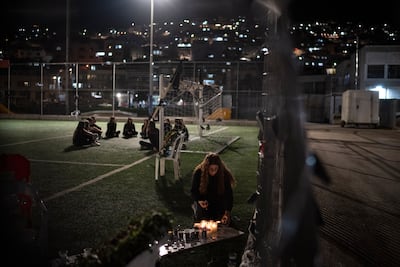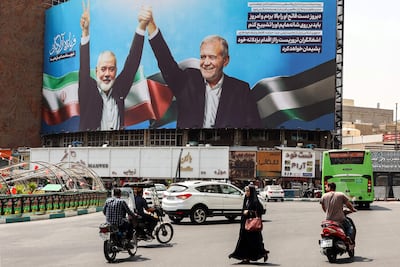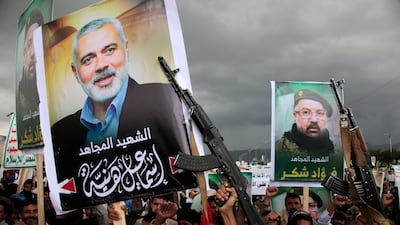The rules of engagement in the conflict between the Iranian-led axis and Israel are evolving, with both sides adjusting their strategies. Israel appears to have adopted a policy of targeted assassinations, sealing the fate of Gaza ceasefire negotiations, while Iran and its allies are adopting a war of attrition. Negotiations for a ceasefire in Gaza seem unlikely to yield a permanent solution in the near future, as a resolution is likely only after several intense rounds of conflict.
These could include simultaneous operations from the Lebanese, Syrian, Yemeni, and Iraqi fronts, directed by Iran's Revolutionary Guard Corps (IRGC), as well as potential direct confrontations between Iran and Israel. Yet, the situation could still be managed to prevent escalation into a larger war involving the US as Israel’s strategic ally against Iran and its four key proxies.
A world war erupting over Gaza is improbable, as neither Russia nor China is expected to engage on Iran’s side against the US and Israel. Nor is the US keen to be dragged into war with Iran, as Israel desires, to achieve multiple goals – primarily the destruction of Iran’s nuclear facilities. However, an imminent escalation is inevitable.
The assassination of Ismail Haniyeh, head of the Hamas political bureau, in Tehran, is a reminder of Israel's security penetrations that have allowed it to repeatedly carry out attacks in Iran, with a large network of agents within Iranian ranks and the ranks of its proxies.
The day before Haniyeh's assassination, an Israeli strike killed senior Hezbollah figure Fouad Shukr in the southern suburbs of Beirut. This was a clear warning to Hezbollah secretary general Hassan Nasrallah. The series of assassinations targeting senior leaders and those very close to him is a message from Israeli intelligence, indicating precise knowledge of the location of Hezbollah’s leadership yet also their decision to refrain from escalating to the point of assassinating Nasrallah, the most crucial partner of the IRGC and the Supreme Leader of the Islamic Republic of Iran, Ayatollah Ali Khamenei.
Israel's justification for the operation as revenge for the killing of 12 Druze children in Majdal Shams in the occupied Syrian Golan Heights, which Israel annexed without international recognition, was an audacious pretext, as the Druze of Majdal Shams are Arabs who rejected Israeli citizenship.

Hezbollah denied Israel's accusation of it having carried out the operation that killed the children playing football, and Israel failed to sell its accusation to the Druze community, especially since the Druze leader in Lebanon, Walid Joumblatt, adopted a firm stance against Israel cynically using Druze victims as a pretext.
Nasrallah viewed the attack on the southern suburbs not as a response to what happened in Majdal Shams but as part of the war and a response to the supportive front for Hamas in its war with Israel. His statements came during the funeral of Fouad Shukr, after the assassination of Haniyeh, and included a message of retaliation.
The Iranian leadership summoned the heads of its proxies to study, co-ordinate, and time its retaliation. It is preparing for operations on all fronts, in revenge for the violation of its dignity and honour, as Nasrallah said last week.
The dilemma facing both Iran and its proxies, as well as Israel, is that while the scene of revenge is frightening, revenge may also be necessary for deterrence. Israel may be more eager to expand the scope of the war to the point of direct confrontation with Iran for several reasons, notably Israel's desire to involve the US in a war against Iran and its arms in Lebanon, Syria, Yemen and Iraq. This would give it opportunity to undermine the Iranian nuclear programme, which is Tehran's absolute priority and something it wants to protect, even at the expense of Palestine.
For Israel, opening a war front against Hezbollah in Lebanon is a useful window to eliminate its military arsenal with its missiles and shelters, which Iran is said to use to store what it likes to conceal, including nuclear materials.
Although US President Joe Biden's administration does not want to wage war against Iran or Lebanon, US Defence Secretary Lloyd Austin proclaimed that the US would stand by Israel in case of war because they are allies. He stressed that an expanded war is not inevitable, but American warships have moved to the region in preparation and readiness for a series of retaliatory actions.
American warships may deter major retaliatory operations by Iran and its axis, as well as Israel, while the Biden administration tries to prevent escalation and revive ceasefire negotiations in Gaza.
Iran is divided between those who prefer patience and moderation in retaliation, a group that includes the new president Masoud Pezeshkian, who recently appointed Javad Zarif as Vice President for Strategic Affairs. Mr Zarif is the former foreign minister known as the architect of the nuclear agreement with Barack Obama's administration.
The other faction considers revenge necessary to restore dignity, led by the Supreme Leader Ali Khamenei. This group wants a comprehensive and massive collective response, meaning Iran and all its arms in the resistance axis, especially since Israeli operations included striking the port of Hodeida in Yemen before the assassination of Shukr in Lebanon and Haniyeh in Tehran.
According to Iranian sources, the Supreme Leader is very angry and wants to inform his regional axis leaders and internal Iranian leaderships that Iran's new strategy no longer relies on avoiding direct confrontation with Israel or fearing a major war in the region. The Supreme Leader wants the response to be co-ordinated, conveyed militarily to Israel and politically to the US.

Joe Biden reportedly sent a warning message to his Iranian counterpart Masoud Pezeshkian, reiterating the US and its partners' commitment to Israel's security, confirming that America would defend it if Iran and its allies tried to attack Israel. This was reported by the Kuwaiti newspaper Al-Jarida, citing a source in the Iranian National Security Council.
According to the message, delivered through the Swiss embassy, Mr Biden called for restraint and confirmed that the Americans were not informed ahead of time of Haniyeh's assassination and are ready to mediate to find a co-ordinated response that saves face for the Iranians. According to the same source, when Supreme Leader Ali Khamenei received the message from Mr Pezeshkian, he ordered him not to respond.
Israel is on high alert, anticipating an imminent response from Hezbollah and Iran, and is studying its options to retaliate against the retaliation and avenge the revenge. This is something Iran is factoring into its plans for its operations. Indeed, according to sources familiar with the thinking in Tehran, Iran is studying what the nature of the Israeli response to Iranian revenge will be before making a final decision on the nature of the co-ordinated operations for Iran and its axis.
According to their information, Iran is telling its friends it is in no hurry to carry out the inevitable revenge and prefers to wait a bit to read the Israeli scene and its developments in the coming days. However, if Israel resorts to new provocative actions, this will affect the timing and nature of the axis's responses.
It is worth mentioning here that Israel did not claim responsibility for the assassination of Ismail Haniyeh. Some do not rule out that the assassination may stem from internal Iranian-Iranian, Palestinian-Palestinian, or perhaps Iranian-Palestinian conflicts. However, this does not rule out that Israel was behind Haniyeh's assassination in Tehran.
Everything is now possible in the cycle of revenge and retaliation, but efforts for de-escalation are continuing. A US-European partnership is seeking to convince Iran to not fall into the trap of Israeli provocation. On the other side, they are pressuring Israel not to undermine the negotiations or replace them with a strategy of assassinations.
Everyone is waiting and watching for the next round of these small wars. The majority of observers are confident that no major world war will start from the Middle East. Indeed, an expanded war scares all players, regional and international.
The developments over the past few weeks have made it clear that Iran fears the implications of an expanded war on its nuclear interests and its proxies. It may therefore prefer to bite its tongue within its strategic patience doctrine to avoid harming its interests by causing the Democratic Party to lose the presidential elections to Republican candidate Donald Trump.
Interests come before principles, after all, especially in light of the costs and benefits calculations of strategic recklessness versus strategic patience.
Live updates: Follow the latest on Israel-Gaza




